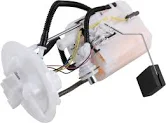A noisy fuel pump typically means there's something wrong. Low fuel tanks a common scapegoat AdvertisementFuel pumps depend not just on gasoline to get fuel to the engine, but also have it cool and lubricate them. Not Recommended–When gas drops below a quarter of a tank the fuel pump can overheat and make noise. Functioning at low fuel levels on a repetitive basis can actually decrease the pump's ability by 20 percent and subsequently affects its life up to thirty percentage over time.
A clogged fuel filter may also cause the noise. If the filter becomes clogged with trash or debris, it will cause the fuel pump to work harder on moving fuel through system. This will also make the operation noise of a centrifugal pump increase greatly. Pista warns that this could have been prevented if the fuel filter were replaced at 30,000 miles as automotive experts recommend. Failure to do so can cut the pump's efficiency up to 15%–25%, potentially leading it work noisier and harder than necessary.
Fuel pump noise Solutions – Vibration and Excessive Wear are also the common reasons of a fuel pump noise. Pumps are usually installed with rubber shock mounts to reduce vibration, but these can deteriorate and allow metal-to-metal contact. This frequently causes a whine or humming noise. When installed in a good condition and well-insulated fuel pumps can work quietly for more than 100,000 miles, while aged components are the cause of increased noise already long before.
Fuel pump noise: Gasoline power to the vehicle is generally not good quality, or even be contaminated. Exposure to fuel That has been contaminated with water, dirt or other impurities can clog the pump and/or fuel lines, elevating pressure on an already cumbersome turbine which makes it sound a lot louder. A story by one of the biggest car magazines talked about a city in which over 40 cars had problems with fuel pumps being damaged it turned out that local gas station was selling gasoline contaminated with water. Increasing noise levels were evident to drivers almost immediately, as was the onset of performance issues.

Noises — This is usually only heard in older switch models and can indicate build-up, dirt or small metal pieces that get lodged between contact points of the switches due to electrical issues. Since the fuel pump needs a steady 12-volt power supply so that it can run properly. If the wiring is not done correctly, or if the connection loosens up a bit of voltage will be lost on its way to lactating pump,, and it starts running crazy—a whirring noise before stopping altogether. A large number of mechanics tell us that between 10% and 15% of problems related to loud fuel pumps they diagnose are due not to the pump mechanically failing, but rather an electrical or wiring issue.
You must also take into account the age of both the vehicle and pump. Fuel pumps do not last forever they start to become inefficient and in many cases a whole lot louder than when new. A grinding or whining noise is usually a sign of the pump coming toward its end-of-life phase, often around 100K miles. While regular maintenance can help prolong the life of a pump, eventually all pumps will wear out and need to be replaced.
There is a famous quote from Henry Ford: “Failure is simply the opportunity to begin again, this time more intelligently. For motorists, this means heeding the early warning signs — such as from a noisy fuel pump — can prevent larger problems. If the sound continues even after taking care of his Fuel Pump, this is a good budget as something might be better than no time to make that decision while on the road if you want your car just crap out.
